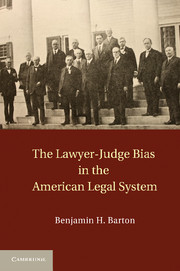Book contents
- Frontmatter
- Contents
- Acknowledgments
- 1 An Ambient Bias
- 2 The Theory
- 3 Constitutional Criminal Procedure
- 4 Civil Constitutional Law
- 5 A Short History of Lawyer Regulation
- 6 Current Lawyer Regulation
- 7 Torts
- 8 Evidence and Civil Procedure
- 9 The Business of Law
- 10 Enron's Sole Survivors
- 11 Complexity and the Lawyer–Judge Bias
- 12 Rays of Hope, Ramifications, and Possible Solutions
- Index
12 - Rays of Hope, Ramifications, and Possible Solutions
Published online by Cambridge University Press: 03 May 2011
- Frontmatter
- Contents
- Acknowledgments
- 1 An Ambient Bias
- 2 The Theory
- 3 Constitutional Criminal Procedure
- 4 Civil Constitutional Law
- 5 A Short History of Lawyer Regulation
- 6 Current Lawyer Regulation
- 7 Torts
- 8 Evidence and Civil Procedure
- 9 The Business of Law
- 10 Enron's Sole Survivors
- 11 Complexity and the Lawyer–Judge Bias
- 12 Rays of Hope, Ramifications, and Possible Solutions
- Index
Summary
I would like to see more people from outside the judicial monastery, somebody who has had some real-life experience, not just as a judge.
– Senator Patrick Leahy on Supreme Court appointmentsBEFORE I TURN TO RAMIFICATIONS AND SOLUTIONS, I discuss a trio of recent Supreme Court cases that suggest a growing awareness of, and resistance to, the lawyer–judge bias. First, consider Montejo v. Louisiana, which I briefly discussed in Chapter 3. Montejo overruled Michigan v. Jackson, which was a criminal procedure case that held that the police could not question a suspect after she had requested the appointment of a lawyer at an arraignment unless the lawyer was present. Jackson stated a strict rule to ensure that questioning under these circumstances would not occur; even if the suspect waived the presence of counsel, any statement in response to lawyerless police questioning must be suppressed. This rule was helpful and deferential to lawyers. As soon as a lawyer was appointed, the lawyer could count on the police to leave the client alone when the lawyer was not present.
Montejo eliminated Jackson's prophylactic rule. After Montejo, the police can question a represented defendant, and if that defendant waives the presence of a lawyer, the defendant's statements are now admissible.
- Type
- Chapter
- Information
- The Lawyer-Judge Bias in the American Legal System , pp. 285 - 300Publisher: Cambridge University PressPrint publication year: 2010

